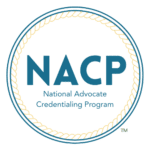Programa Nacional de Acreditación de Defensores

About The NACP
The National Advocate Credentialing Program (NACP)® professionalizes victim advocacy and upholds high standards, by providing credentialing services which evaluate and recognize standard training and direct service experience in victim services. Through our work, we are empowering advocates to be the best they can.
OUR MISSION: To professionalize the field of victim advocacy and maintain professional standards of best practices for victim service providers through credentialing that recognizes standard training and direct service experience.
El National Advocate Credentialing Program® (NACP), developed through the cooperative effort of multiple national and state victim assistance organizations, was launched in 2003 as the first voluntary credentialing program available to crime victim advocates nationwide.
Discussion about a national credentialing program for victim assistance professionals began in the 1980’s. By the early 90’s, several states had successful credentialing programs. In 2000, NOVA invited representatives from state, federal and national victim assistance organizations to discuss the implementation of a national credentialing program. At a meeting in 2001, although not all of the representatives reached consensus about co-sponsorship, NOVA’s members overwhelmingly supported the concept. In 2002, the NOVA Board of Directors unanimously voted to develop a national credentialing program. The Board introduced the NACP at NOVA’s 28th Annual Victim Assistance Conference in Nashville in 2002, and launched it in 2003. In 2012, the framework of NACP was used as the model for the development of the Department of Defense-Sexual Assault Advocate Certification Program, also known as D-SAACP.
NACP New & Updates
Meet your NACP Team!

Danielle C. Kitchen
Application Windows and Review Dates
Application Window
Review Dates
Scheduled Review*
November 1st – January 31st
February
February 24-25, 2026
February 1st – April 30th
May/June
June 8 – 9, 2026
May 1st – July 31st
August
August 25 – 26, 2026
August 1st – October 31st
November/December
December 10 – 11, 2025
December 8 – 9, 2026
*Scheduled review dates are updated annually and are subject to change.
Benefits of Credentialing
Credentialing offers many benefits to those in the victim assistance field.
- Increase recognition, credibility, and professional mobility within the victim assistance field.
- Promote and recognize the implementation of standardized training.
- Ensure that the standards and practices of the field are initiated and defined by victim assistance professionals rather than external professional groups.
- Foster professional identity and unity among victim service professionals who adhere to a shared Professional Code of Ethics.
- Provide credentialed advocates with a certificate suitable for framing and a portable wallet card to signify their achievement.
- Enable credentialed advocates to use the designation “CA” after their names to reflect their professional status.
Apply to be a Credentialed Advocate
Direct service experience is assessed to determine the level of credentialing that applicants are eligible for and training experience is assessed based on the level being applied for.
New Applicants—All Levels of Credentialing:
- Minimum Training Requirement- Successful completion of an NACP Pre-Approved Training within 10 years of applying for NACP Credentialing (certificates of completion or transcripts are required).
- Código de Ética Profesional para Proveedores de Servicios a Víctimas
- Declarations
Provisional Level of Credentialing:
No direct service experience required
- Minimum training requirement met and documentation provided.
Basic, Intermediate or Advanced Levels of Credentialing:
- Direct Service Verification (Verification of Experience Form)
- Basic: 3,900 hours providing direct services to victims and survivors of crime are required
- Intermediate: 7,800 hours providing direct services to victims and survivors of crime are required
- Advanced: 15,600 hours providing direct services to victims and survivors of crime are required
- Code of Professional Ethics for Victim Services Providers
- Declarations
- 3 Applicant Recommendation Forms (on agency letterhead)
First Time Applicants
Step 1: Determine which NACP Pre-Approved Training you have successfully completed within 10 years of applying & upload your certificate of completion.
Step 2: Determine the level of credentialing that best fits your direct service experience by reviewing our Instructions for Verification of Experience or by assessing the level of your current D-SAACP credential.
- Provisional Level of Credentialing: No direct service experience required.
- Basic Level of Credentialing: 3,900 hours (approximately 2 years of full-time experience) providing direct services to victims and survivors of crime are required.
- Intermediate Level of Credentialing: 7,800 hours (approximately 4 years of full-time experience) providing direct services to victims and survivors of crime are required.
- Advanced Level of Credentialing: 15,600 hours (approximately 8 years of full-time experience) providing direct services to victims and survivors of crime are required.
- D-SAACP to NACP Bridge: equivalent level and expiration date of your D-SAACP certification (see below for details)
Step 3: Apply for Credentialing below as a first time applicant based on the number of direct service hours calculated or by assessing your current D-SAAACP Credential.
Provisional Level Applicants
No direct service experience required
- Minimum training requirement met and documentation provided.
- Certificate of completion from the NACP Pre-Approved Training you completed;
- Application Fee ($70.00 standard/ $55.00 Member)
New Basic, Intermediate or Advanced Applicants
The level of NACP Credentialing awarded is based on the number of hours of direct service victim advocacy experience.
- Certificate of completion from the NACP Pre-Approved Training you completed;
- Verification of Experience Form(s);
- Letter of Recommendation Forms (3)
- Application Fee ($140.00 standard/ $110.00 Member)
Basic: 3,900 hours of direct service advocacy experience
Intermediate: 7,800 hours of direct service advocacy experience
Advanced: 15,600 hours of direct service advocacy experience
D-SAACP to NACP Bridge Applicants
A Bridge Application is for those moving from military to civilian advocacy or those who wish to be dual credentialed by D-SAACP and NACP.
- A copy of most recent D-SAACP Credential to verify your direct service and training experience.
- D-SAACP credentials must be active or less than 6 months expired at the time of applying with a Bridge Application.
What to do if your credentials are expired at the time of applying. >>>
D-SAACP Level I: NACP Provisional
D-SAACP Level II: NACP Basic
D-SAACP Level III: NACP Intermediate
D-SAACP Level IV: NACP Advanced
Renewal Applicants
Step 1: Review NACP’s Continuing Education (CE) Guidance to ensure you meet the minimum renewal requirements!
Step 2: Determine if you are applying to renew your credentials at their current level OR if you meet the direct service requirement to renew and upgrade your credentials to the next level by reviewing our Instructions for Verification of Experience (Note: you are building off of your last application when assessing direct service hours).
- Basic Level of Credentialing: 3,900 hours (approximately 2 years of full-time experience) providing direct services to victims and survivors of crime are required.
- Intermediate Level of Credentialing: 7,800 hours (approximately 4 years of full-time experience) providing direct services to victims and survivors of crime are required.
- Advanced Level of Credentialing: 15,600 hours (approximately 8 years of full-time experience) providing direct services to victims and survivors of crime are required.
Step 3: Apply to renew your credentials below using the application that fits your direct service experience best.
Current Level Renewal Applicants
Maintain your NACP Credential at its current level.
- Indicate 32 hours of victim services specific continuing education (CE) that have been successfully completed within 2 years of the application you are submitting.
- Provide certificates of completion for all CE trainings indicated within your submission.
- Note: NACP CED Forms are required in lieu of any other documentation if a certificate of completion or transcript is not provided for the training attended.
- Application Fee ($100.00 standard/ $80.00 Member)
Renewal & Upgrade Applicants
Remember that you are building off of our last application when calculating direct service hours to meet minimum direct service requirements to upgrade!
- Verification of Experience Form(s);
- Letter of Recommendation Forms (3)
- Application Fee ($140.00 standard/ $110.00 Member)
- Upgrade from Provisional Level:
- Verification of Experience Form(s) indicate a minimum of 3,900 hours of direct service advocacy experience.
- Upgrade from Basic Level:
- Verification of Experience Form(s) indicate a minimum of 7,800 hours of direct service advocacy experience.
- Upgrade from Intermediate Level:
- Verification of Experience Form(s) indicate a minimum of 15,600 hours of direct service advocacy experience.
NACP Scholarships
We are committed to the professionalization of all crime victim advocates and allied professionals. NACP offers need-based scholarships to victim advocates who are new to the field of advocacy.
- Advocates with two (2) or less years of direct service experience specific to victims and survivors of crime
- Advocates with who can convey a financial need or organization restrictions to securing funding to apply for NACP Credentialing
- Completed Application submitted by 11:59pm EST on the deadline indicated below (specific to Review Committee schedule)
- Resume
Application Windows:
- Nov. 1st-Jan. 31st (February Review)
- Feb. 1st– April 30th (May/June Review)
- May 1st– July 31st (August Review)
- Aug. 1st– Oct. 31st (Nov./Dec. Review)
NACP Forms
The NACP has built a resource page for you to easily access the following information:
NACP Pre-Approved Introductory Advocacy Trainings, How to Get Your Training Pre-Approved, Continuing Education Guidelines for Renewing Credentials, Trainings Commonly Used for Continuing Education, and Frequently Asked Questions!
